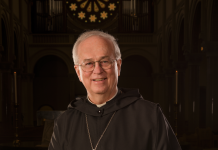Column by Father Jonathan Dickson
This past Sunday, the Third Sunday of Easter, the Church shared the Gospel commonly known as The Road to Emmaus (Luke 24:13-35). I love this story because it is a detailed account of an encounter with the Risen Christ. I hope this story echoes in all of our hearts as we all long for this encounter. For the sake of brevity, I would like to comment on two aspects of the story that both bookend the narrative and paint a vivid image of how this encounter is likely to be a reality for us even 2000 years later. The first, is how Jesus approaches us, and the second is the invitation on our behalf. (This may be a good point to stop and read the story). Before I go on, I would like to point out that this would have been an extraordinarily unsettling time for these disciples. They had put their entire trust into who they thought was the Messiah, and quite frankly they felt as if he had let them down. Not only that, but as followers of his, they were probably in fear as their lives were likely now also in danger. Allow me to point out that for the modern reader, there is nothing about this situation that suggests a perfect opportunity for an encounter with Jesus Christ. There is no jaw-dropping experience; there is no shining light, crack of thunder, or sudden personal awareness that he is there. As a matter of fact, they travelled with this person for roughly three years and they didn’t even recognize him as he approached.
And so, two dejected people are on the road to Emmaus trying to figure out where it all went wrong. While there is no way that we can tell what the disciples are talking about, based on what they tell Jesus (who is still hidden to them) I would suggest that we could title their conversation: My God My God Why Have You Abandoned Me. Jesus himself, utters these words from the cross in both Matthew and Mark. It is not a stretch to imagine that these men were feeling helpless, sad, hurt, and maybe on the borderline of despair. Surely Jesus could sense and understand this. But, in what may seem an odd turn of events, Jesus approaches them quite content to be seen as a total stranger. There must have been a gentleness in his approach or they would have been alarmed, but he approaches as a stranger nonetheless.
To the first point that I mentioned in the introduction — Jesus more often than not, and in my experience almost always approaches us precisely in this way, as a stranger, or seemingly “in disguise.” While I personally hope I have an ongoing relationship with Jesus Christ, I usually only recognize the times that he has “clearly” approached me, in reflection, after the matter. Christ comes to us hidden, or in disguise, not because he is trying to dupe us, but because he refuses to fit the mold of how we choose to accept him, or how we want him to be. He is a face in the crowd, he is the person that you least wanted to see today, he is your mom or dad, son or daughter, husband or wife, and even the person on the Zoom call after weeks of quarantine. He comes to us when we are so entrenched in our own preoccupations. He comes to us after hours of praying for the same thing,and right at that moment when we are about to give up. Over and over again he shatters our expectations.
He comes benevolent, and he comes wanting to hear it all. He comes to us exactly how we are at any given time, and so often he comes to us in times of our greatest doubt. In short, the Jesus of Emmaus is perpetual, he is always coming to us. But, and this is important, he never forces himself on us. This leads to the second point. Jesus reveals himself to the disciples in the “breaking of the bread” but only after they invite him in at that moment when he appears to be moving on. Most of us have seen an image of the famous piece of art where Jesus is outside knocking at a door that only opens from the inside. “My God My God why have you abandoned me?”
His reply, “I haven’t! You just haven’t invited me in for quite some time. When the pandemic hit, you questioned me, but I kept coming. When the quarantine was imposed, you shut the door on my face, but I continued to knock. When you found out that school was done for the year, you had to be stuck at home, and when you couldn’t see your friends, you bolted the door shut. When all your plans came to a screeching halt and your world was turned upside down you moved a dresser in front of the door. As the quarantine reached its fever pitch, you even plugged your ears so that you could not hear that subtle, but steady knock, “but I continue to knock,” he says.
The disciples approached the village after what I would argue may have been a few hours of conversation. And Luke records, “he gave the impression that he was going on further. But they urged him, ‘Stay with us…’” Then the true encounter took place. We are all on the road to Emmaus right now. Everything is disjointed and many of us are on the borderline of despair. And yet as the cross clearly demonstrates, God insists on entering into our chaos. Jesus approaches us seemingly in disguise, almost entirely unrecognizable, as a stranger, and in the one we would least expect. Do we dare invite him in?
Father Jonathan Dickson is the Parochial Vicar at Our Lady of Victory Parish in State College, Chaplain at Saint Joseph’s Catholic Academy in Boalsburg, and Diocesan Director of Ongoing Formation for the Clergy.






























